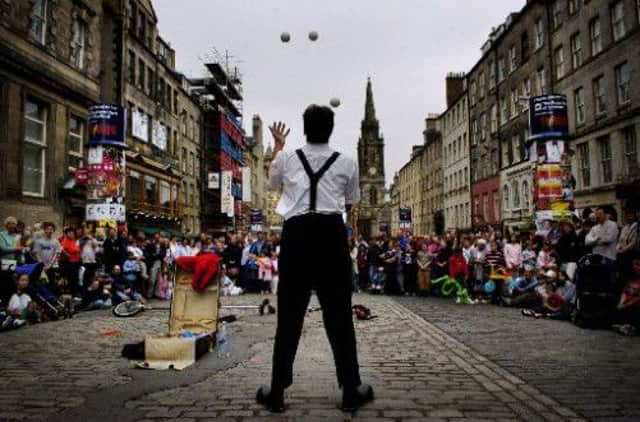Comment: Culture key to power on international stage


What is less well known, and took me by surprise on a visit a few years back as director of science for the British Council, is that the experiment is a part of a massive co-operation project between 20 member states and involves another 56 countries.
In the control room where data floods in from the Atlas detector linked to the collider, you will see a young Iranian researcher sitting next to an American, a Palestinian sitting side-by-side with an Israeli, and a Pakistani researcher modelling data on a laptop with an Indian. And you’ll see a screen showing real-time data feeding to labs around the world, from Argentina to Belarus, using a grid that will one day replace the internet. It was a reminder that there are fields of interest that transcend national boundaries and connect people around the world in the pursuit of common challenges.
Advertisement
Hide AdAdvertisement
Hide AdAs we prepared recently for this week’s Scottish launch of a British Council-commissioned report by Demos into the role that culture plays in the race for soft power in the 21st century, I thought back on that episode at the LHC; how culture, like the sciences, really does bring people together – even those with very different world views. And, in turn, the connections made through fields that have no borders can encourage the solving of social and economic problems that have previously proven intractable by more traditional diplomatic routes.
What happens in the cultural arena increasingly has an impact on how politicians operate and it is now true to say that cultural and political influence go hand in hand. If you look at the successful economies of the future, countries such as Brazil and India are investing the most heavily in promoting themselves through culture. An attractive culture gives countries the chance to make a difference in international affairs.
We are pleased to have Karen Watt, director for external affairs in the Scottish Government, addressing our launch in Edinburgh this week. She works with Fiona Hyslop, Cabinet secretary for culture and external affairs. While foreign policy is reserved to Westminster, culture is a devolved power in Scotland; in that respect – because we know culture is a route to international influence and economic benefit – you could argue that our soft power report has extra relevance for Scotland.
We are fortunate to have an administration that has raised the importance of culture, and has actively promoted Scotland as a cultural beacon. Last year, together with the Scottish Government and other partners, we organised a culture summit in Edinburgh attended by culture ministers from more than 30 countries.
It was the first time an event like that had taken place, and it gave culture a prominence on the international political agenda like never before. While we won’t be holding a culture summit this year, we are running a significant programme to bring scores of key cultural officials from around the world to Edinburgh.
We’re only a month away from this year’s Edinburgh festivals, when the city becomes the cultural capital of the world. We’ve been working with Festivals Edinburgh and Creative Scotland to ensure that we are plugged into the right people and places to build strong international connections for this year’s cultural gathering. Scotland’s culture is its national identity among nations and it should, as a political strategy, continue to put its best foot forward and draw on its best talents – artists and leaders – in the business of promoting Scotland abroad. It is crucial that the country has a distinctive voice on the international stage and culture allows it to enter from stage left.
British Council Scotland has a history of involvement in the Scottish arts arena that stretches back to the end of the Second World War. While doing research recently, I was interested to discover that soft power and its role in post-conflict reconstruction were in evidence at the very first Edinburgh Festival in 1947.
That year, our organisation was instrumental in appointing an Austrian-Jewish refugee to the post of festival director and in bringing a German operatic company to Edinburgh. Fast-forward 65 years to last year’s festival and, in a similar vein, it’s noteworthy that the Scottish Government and ourselves helped bring the National Orchestra of Iraq to Scotland.
Advertisement
Hide AdAdvertisement
Hide AdThrough both of these examples , people involved in Scotland’s cultural scene stood up and asked questions about how culture could play a role in helping international communities rise to the geopolitical challenges of the day; and their actions have played a part in raising understanding and encouraging solutions where more standard statecraft had been lacking.
Scotland has a great deal to exchange with the world, but we need to ensure that all of us who promote its cultural assets don’t rest on our laurels.
While the festival provides a great cultural and economic boon for Scotland, we must continue to celebrate and promote our vibrant culture and creativity throughout the year and plan for the future, so that Scotland not only retains its distinctive international voice but also takes it to the next level. Fortunately, the signs are encouraging that Scotland can and will indeed continue to place culture centre stage.
Next year is a special year, with a cultural calendar around events like the Commonwealth Games in Glasgow and the second Year of Homecoming; let’s make sure the power of culture continues to build trust and dialogue and elevates Scotland’s standing on the international stage.
• Lloyd Anderson is country director for the British Council Scotland